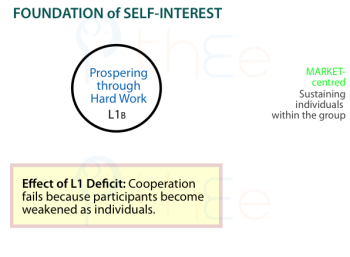Building on Self-Interest: L1 Choices
Self-Interest is a Responsibility

All cooperation is, by definition, amongst individuals, and therefore it must be built on a foundation of the self-interest of each. In the present context, we mean prospering through hard work on one’s own behalf.
In practice, the way to ensure self-interest and avoid harm is if each individual is responsible for himself. In a business context, each organization must give priority to its own efforts, revenues, costs and profits.
Self-interest is inescapable—and it is a duty on everyone:
this is deontological ethics because the purposes in cooperating are ethically secondary.
: Market-centred Principles from a purely personal perspective.
Does imply a Participant focus or a Shared-Endeavour focus or both?
The stronger (more confident, more resourced, more capable, more profitable) the Participant, the more attention can be given to the Shared Endeavour. If any Participant is not prospering on their own account, then they will not cooperate well or possibly at all. But the Shared Endeavour is only of interest for Participants because of the belief in its worth for each of them. So the attention given to the Shared Endeavour must be producing benefit for the Participant. If it were not, the Participant would seek to withdraw, or—if involved under an obligation—would withdraw internally while outwardly seemingly to continue to participate.
That means is a Balanced Centre.
At L1, the participant v shared-endeavour duality involves both poles simultaneously, so this is a Balanced Centre with the formula: .
Limitation
Each individual asks: "Would this time, attention and other resources of mine be better and more securely spent on my own work rather than that joint effort?"
![]() Q: Why cooperate? Why isn't personal hard work sufficient?
Q: Why cooperate? Why isn't personal hard work sufficient?
-
So at least one additional level must be activated to add a degree of security for anyone involved. This means using power-centred principles.
-
Go now to Level-2: Establishing security.
Originally posted: July 2009